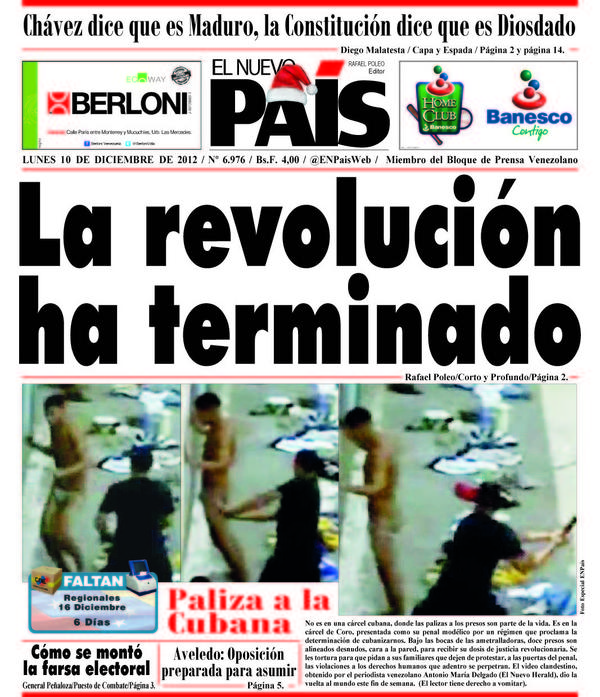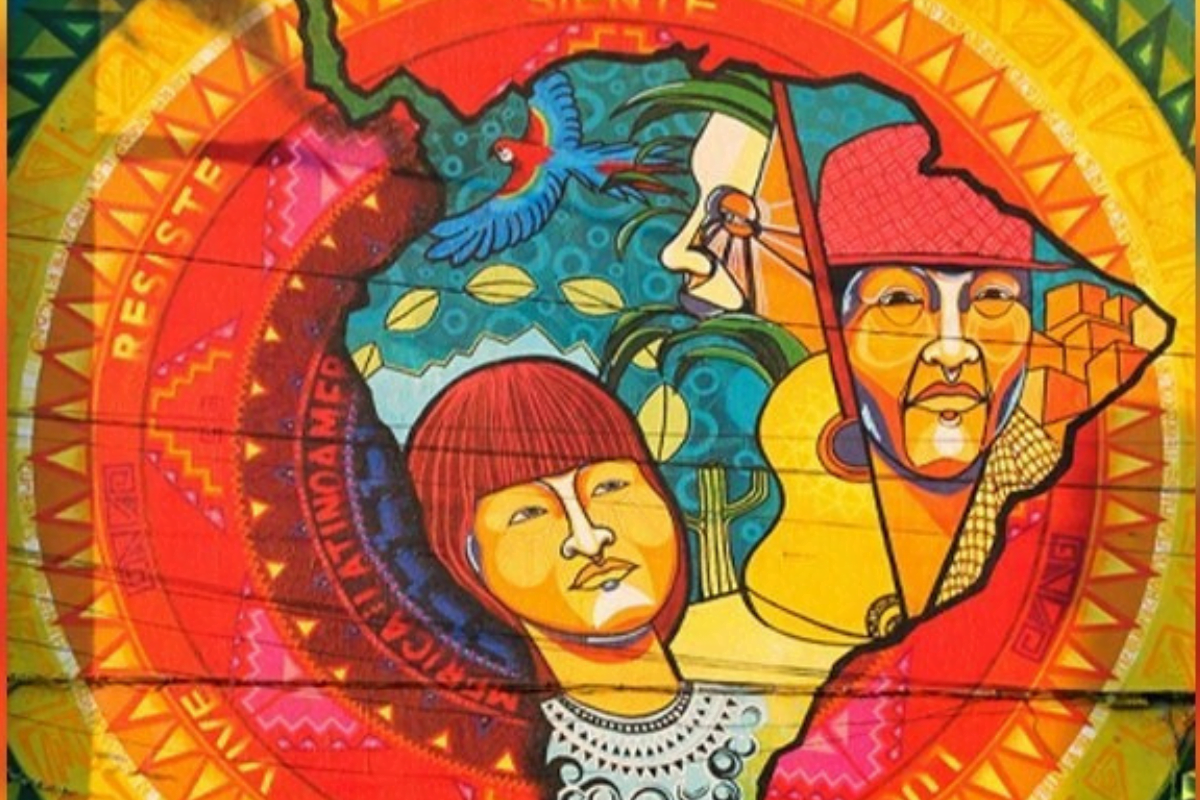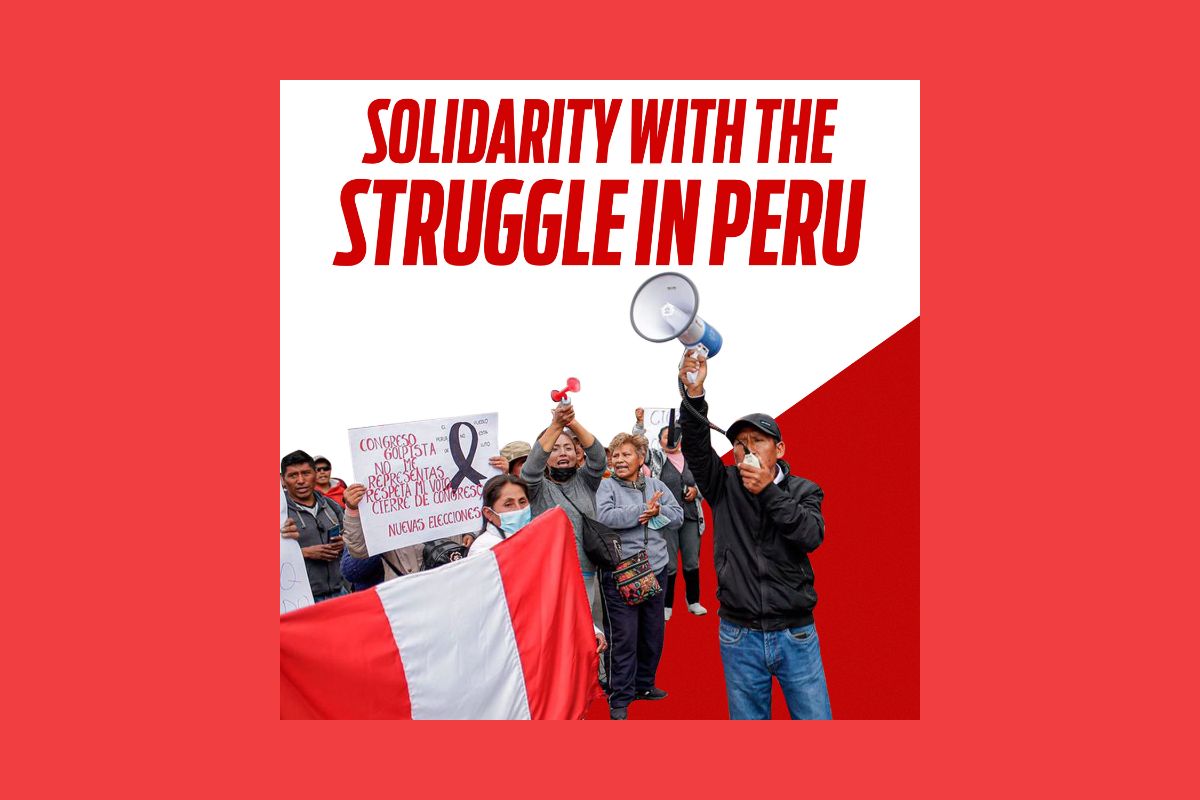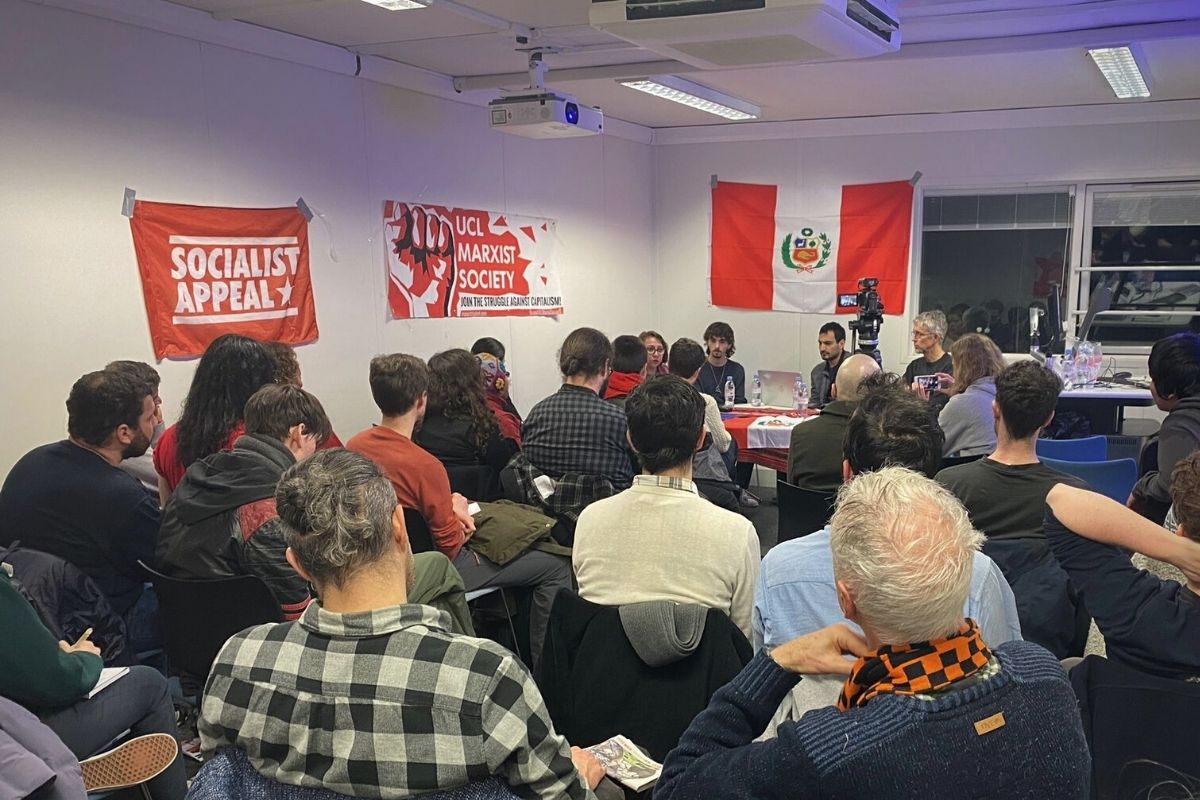On Saturday, December 8, Venezuelan
president Chávez announced that he would have to undergo another
surgical intervention in Cuba. Adding that “there are always risks in
processes like this” he explained that “if anything happens to me that
hinders me [from performing as president]”, vice president Maduro is his
preference to replace him.
On Saturday, December 8, Venezuelan
president Chávez announced that he would have to undergo another
surgical intervention in Cuba. Adding that “there are always risks in
processes like this” he explained that “if anything happens to me that
hinders me [from performing as president]”, vice president Maduro is his
preference to replace him.
Chavez leaving hospital in 2011The
announcement came as a shock to the Bolivarian masses. This was the
first time that Chávez spoke about his choice of replacement in the
leadership of the revolution and this indicates that he is worried
something might go wrong with his treatment. Tens of thousands of
Venezuelans came out on Sunday, filling the Bolivar squares in every
town and city to show their support for the president.
The Venezuelan oligarchy and imperialism immediately jumped on this
announcement in an indecent haste to get rid of Chávez. They argued that
according to the article 234 constitution in the event of a temporary
absence of the president, the vice president Maduro should assume the
presidency. As a matter of fact, Chávez has used the provision in
article 235 of the constitution to ask permission from the National
Assembly to be absent from the country for over 5 days. This was granted
on Sunday, December 9.
Behind these legalistic arguments there is the clear aim of the
opposition to remove Chávez from office in the hope that he will not be
able to come back. Let us not forget that ever since he was elected in
1998, the oligarchy, the owners of banks, the land, the media and big
businesses, and imperialism have waged a relentless campaign to defeat
the revolution and overthrow Chávez using all means at their disposal,
legal and illegal. This included the coup in April 2002, the criminal
lock out and sabotage of the oil industry in 2002-2003, the guarimba
riots of 2004 (at which time 100 Colombian paramilitaries were arrested
in a ranch near the capital), the recall referendum of 2004, a constant
investment strike, sabotage of the food distribution chain (including
hoarding, racketeering and smuggling), etc.
Now, by insisting on the removal of Chávez as a president, they want
to achieve what they could not get in the October 7 elections. There is a
good reason why they are so fixated in the figure of Chávez: he plays a
key role in the Bolivarian revolution. There is an almost symbiotic
relationship between the president and the Bolivarian masses which are
the motor force of the revolution. Chávez has always shown himself to be
sensitive to the pressures from below and the masses consider him as
one of their own.
This is in stark contrast with many of the other top figures in the
Bolivarian movement, ministers, governors, local mayors, etc. None of
them has even a fraction of the moral standing and political authority
Chávez commands amongst the working class and the poor which are the
basis of support for the revolution. Many are seen as corrupt careerists
out to make a personal gain from their allegiance to the Bolivarian
movement. While the revolutionary people, the workers, the peasants and
the poor came out on the streets against the coup in April 2002, many of
the “Bolivarian” regional governors swore loyalty to the new
illegitimate coup-government of Carmona, only to quickly switch sides
again as the masses defeated the coup.
In important states like Aragua, Lara, Monagas and others, we have seen “Bolivarian” governors jump ship (saltar la talanquera)
and join the reactionary opposition. Others remain on the Bolivarian
side of the fence, but act as bourgeois IV Republic type politicians,
dishing out jobs and positions to cronies and family members, getting
involved in all sorts of corruption.
The bureaucracy in the state institutions in many instances acts as a
block to the revolutionary initiative of the masses. In many occasions
the workers and the poor have reached directly to Chávez over the heads
of Ministers and governors to get things done. Just to give an example
the heroic struggle of the workers of SIDOR, against the regional
governor Rangel who sent the National Guard against them and against the
then Minister of Labour Ramon Rivero, which finally got Chávez to
decree the expulsion of the multinational and the re-nationalisation of
this key steel plant in Guayana. Rivero also lost his job as a result.
Then, the workers in the basic industries demanded that workers’
control should be introduced, again, in opposition to the stated
position of managers, directors and ministers. Finally Chávez called a
meeting to establish the Socialist Guayana Plan and agreed to the
workers’ demands, nominating a series of worker-directors in the key
state owned factories.
There are many other examples like this which have solidified the
relationship between the president and the revolutionary masses and at
the same time strengthened a deep rooted current of suspicion and
distrust towards the bureaucrats and reformists at the top of the
movement.
The ruling class and imperialism are calculating that while Chávez is
“unpredictable” (meaning he is quite capable of taking bold decisions
and of striking blows against their interests), anyone who replaces him
will be easier to defeat in elections and at the same time more amenable
to the pressure of bourgeois public opinion towards conciliation and
concessions. Chavismo without Chávez, they think, would lose its revolutionary edge, becoming much safer for the interests of private property.
 Immediately
Immediately
after Chávez made his announcement, opposition supporters used the
twitter hash tag #RIPChavez, revealing the disgusting lack of any
morality on the part of more crazy elements of this “democratic”
opposition. In the same vein the most extreme opposition commentators
declared the end of the revolution (El Nuevo Pais published a
frontpage headline declaring "The Revolution is Over"). The most
intelligent representatives of the ruling class however, took a
different line. Attempting to disguise their jubilation at the news of
Chávez’s ill health, they stressed the need for national unity across
the political divide, for reconciliation and dialogue, etc.
The business organisation Fedecamaras (which played a crucial role in
the April 2002 coup), issued a statement along the same lines. In a
press conference on Monday, December 10, they asked for an urgent
meeting with vice president Nicolás Maduro “to agree urgent
macro-economic adjustments” which they think Venezuela requires. They
are basically asking for concessions from the government regarding
exchange controls (a possible devaluation), liberalisation of prices of
regulated food products, etc.
Fedecamaras president Jorge Botti did not mince his words: “Let’s
not wait until January. Decisions need to be taken now; we ask directly
the acting president of the Republic, Nicolás Maduro, to jointly take
together with his economic area ministers the necessary decisions as
soon as possible.” (Patronal pide reunión a Maduro y dice Venezuela está virtualmente paralizada)
Notice the arrogance of this people. They were soundly defeated in
the presidential elections just over two months ago and they now want to
rule the country and take the most important economic decisions.
The financial press and investment analysts have insisted in
describing Maduro as a man of dialogue, “someone we can talk to.”
Stratfor described him as “pragmatic”, while Barclays Capital said
earlier this year that if Maduro was to lead the government “we could
expect a more moderate approach” from him. Whether this is just wishful
thinking on the part of the capitalists remains to be seen. What they
wish for is clear: for Chávez to be out of the picture and for a new
government to make all sorts of concessions to big business and
multinationals and abandon any idea of moving towards a nationalised
planned economy.
There is another field in which the oligarchy is testing the terrain:
the so-called political prisoners and exiles. Immediate after their
election defeat on October 7th they started a campaign around
this question. They say that all those who have been imprisoned for
“political reasons” and those who have had to flee the country because
of “political persecution” should be amnestied. First of all let us be
clear about this question, we are not talking here about people who are
persecuted because of their political views, but about politicians who
broke the law and are either in jail or (the majority of them) have fled
the country to escape justice.
These are the people who carried out the coup in April 2002
(including brief coup-president Pedro Carmona in “exile” in Colombia),
the people who organised the sabotage of the oil industry 10 years ago
now, Manuel Rosales who was charged with corruption and left for Perú,
others who are wanted in relation to the assassination of state
prosecutor Danilo Anderson (who was investigating the April 2002 coup
when he was killed), etc. These people should be tried and made to pay
for their crimes, for which they have not even apologised or shown any
remorse.
The fact that it was suggested by opposition deputy Edgar Zambrano,
who is travelling around the world to get a full list of these “exiles”
(in Miami, Madrid, Bogotá, etc), that the “government through Nicolás
Maduro has expressed political will to solve this issue”, is scandalous
and created an uproar amongst Bolivarian activists. No government
spokesperson has refuted this statement so far.
What we can see is a situation in which the capitalists are exerting
pressure on the leadership of the Bolivarian movement towards
conciliation and concessions. On the other hand the Bolivarian masses
want to push forward, towards the completion of the revolution, but they
find themselves without a clear leadership and without any democratic
revolutionary structure through which they can decide over the course of
the revolution.
It is worth remembering that for the last 14 years the masses have
responded in their millions any time they have had a chance to get
organised. In the Bolivarian Circles at the very beginning, in the
Electoral Battle Units during the recall referendum, the launching of
the Frente Francisco Miranda, the creation of the UNT trade union, the
founding of the PSUV, the founding of its youth organisation JPSUV, and
many others. Within these organisations, the masses have also
instinctively rallied to the different leaders which appeared to be more
radical, more consistent in maintaining their links to the rank and
file and waging the most decided battle against the oligarchy. Every
single time, after a brief period of enthusiasm, democratic discussion
and revolutionary fervour from the rank and file and activists, the
bureaucracy has managed to close down these spaces and organisations.
The PSUV Youth had its founding congress in 2008 at which the
attempts to introduce an undemocratic constitution were defeated, and
has not had another congress since then. The PSUV itself had a very
democratic and left leaning founding congress and then an ideological
one in 2010, but its structures had been reduced mostly to an electoral
machine. The members did not even have a say in the selection of the
candidates for the forthcoming regional elections on December 16.
The Bolivarian revolution is clearly at a crossroads, in which
different political lines are being proposed as to what is the way
forward.
The bureaucracy for instance has destroyed the Plan Guayana
Socialista which we described before, removing all of the
worker-directors in the basic industries. This was done through a
concerted campaign of open sabotage, discrediting, slanders and physical
violence, orchestrated by all those who, for their own different
reasons, are against workers’ control. The FBT trade union faction has
played a key role in this campaign and so was the regional governor
Rangel Gómez. The discontent is so great amongst the worker activists in
the region that there is growing support for the other Bolivarian
candidate Arciniega, standing on a Communist Party ticket.
Sections of the Bolivarian leadership advocate a sort of mixed
economy in which the “socialist” elements would progressively spread and
finally, sometime in the future, overcome the capitalist ones. In this
way, allegedly, we would get to a socialist society without upsetting
the ruling class too much too early. In our opinion this is a suicidal
course, because it means that the normal functioning of the capitalist
market economy is being disrupted without it being replaced by a
democratic plan of production based on nationalisation of the means of
production. This situation leads to scarcity, sabotage, inflation and
general disorganisation of the economy which hits mainly the poorest
sections which are the natural base of support for the revolution.
In his speech on Saturday about the situation of his health, Chávez
made an appeal for unity of the movement. We are the first ones to be
in favour of a united revolutionary movement. But the differences exist
and are real. The only way to achieve unity is if the revolutionary
movement as a whole can discuss them and make an informed decision. It
is precisely when the bureaucracy curtails the democracy of the movement
that division ensues.
Once again, the masses, on October 7th delivered yet
another electoral victory to the Bolivarian revolution by voting for
president Chávez. He stood on a program which talks about a socialist
economy and doing away with the old state apparatus. Now it is not the
time for conciliation or for talks with the capitalists. It is time to
put this program into practice. In our opinion this can only be done
through the expropriation of the means of production, the banks and the
big landed estates under democratic workers’ control.
The illness of president Chávez brings out clearly the fact that one
single man cannot carry out a socialist revolution. It is the time for
the working class and the poor to take the initiative into their own
hands.
A national revolutionary congress should be convened with delegates
elected in each factory, workplace, working class neighbourhood and
peasant community so that it can take the necessary decisions about what
should be the next step.
No conciliation – forward to socialism!






